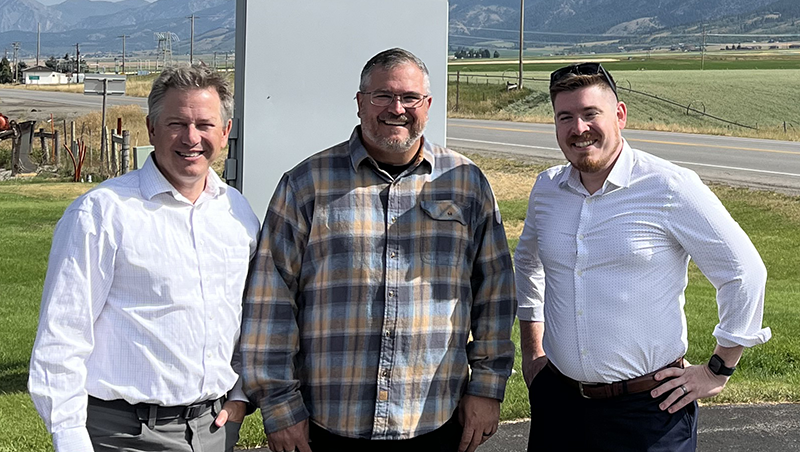NCSC Funds Unique, Privately Owned Open-Access Broadband Projects

A pair of open-access broadband projects are ramping up in Jackson, Wyoming, and Rexburg, Idaho. Although government-owned and funded open-access networks are not new, these are the first privately funded projects of their kind and could lay the groundwork for a new approach to rural broadband expansion. NCSC is proud to have been selected to provide financing for these unique projects by owner/operator Silver Star Communications.
“In our area of the country, we are seeing more and more municipalities considering the construction and operation of municipally owned open-access networks. We understand their motivation, but also believe a government-owned network is not the best solution,” Silver Star Chief Financial Officer Jefferson England said. “We started out with the idea of meeting a local need, and in the process feel like we are changing how our industry will operate.”
The lack of high-speed broadband connectivity for the residents of Jackson and Rexburg was the primary driver for building in those communities, but other considerations encouraged Silver Star’s decision to build a privately funded, open-access network.
“The business corridors in both Jackson and Rexburg have sufficient competitive choice and pricing. The residential areas are where the connectivity struggles begin. Both projects are fiber overbuilds of aging networks, and our open-access model allows for true competitive choice from multiple internet service providers (ISPs) all operating over a single network,” England said.
He said the use of private funds gave Silver Star the most flexibility to determine its own future. “In any government-funded project, the government is the customer. In privately funded projects, our customers are the customer,” England explained.
He also said Silver Star’s decision to open its network to competitors ensured the telco had some revenue protection from leasing the facilities to competitors, as well as providing its own internet services to the end customer.
Thanks to NCSC, our deployment plan was much more aggressive. Municipal plans that are dependent on tax revenue or bonds take upwards of 10 to 20 years to accomplish.

Open-Access Networks Spur Competition
England said Silver Star’s privately funded model attracts reputable ISPs to participate on the open-access network, all of which contribute to the community. The company has also seen lower prices and higher capacity offerings on its private network, as well as a variety of approaches to customer care.
“And there are no taxpayer consequences in our privately funded model, so that’s a win,” England added.
Each project allows up to four other ISPs to provide service using the network, and Silver Star charges them a fee to participate and a monthly lease rate by location.
“Typically, one of the biggest limiting factors for quality ISPs operating on a municipal open-access network is the number of participating ISPs,” England said. “When the network has too many providers, ISPs are less likely to provide customer support beyond an auto attendant, less likely to spend marketing dollars and less likely to invest in modernization of router equipment or services. We’ve found that with five ISPs, the customer is willing to research what option is best for them. With 20 ISPs, the research required to make a decision is too overwhelming and the customer just chooses based on price. When you have a race to the bottom on price, all you have on your network are bottom-feeder ISPs.”

Silver Star Chief Financial Officer Jefferson England and Director of Accounting Darrin Collard recently provided a tour of their operations to NCSC Director of Portfolio Management Ian Flanders. The group stopped outside their offices in Wyoming.
Network Construction Is on Track
Silver Star began network construction in the last quarter of 2023 and expects to finish in 2026. The first customers were turned on in the second quarter of this year. Unlike other networks, Silver Star decided to offer customer drops for free, which has helped boost its take rate.
“We are on track with our goals,” England said. “Our decision to offer a free drop was to get as many people on the network as possible. We believe this approach has positively impacted the take rate, but the bigger draw is the competitive choice.”
Unlike many municipal networks, Silver Star does dictate what speeds ISPs are required to offer. They are seeing plans on the network ranging from 100 MB as a minimum, to multi-gig. The largest percentage of customers sign up for 1 GB or higher plans.
“Customer feedback has been positive, and the participating ISPs on the network claim ours is their favorite open-access network to operate on,” England said.
NCSC Provided Financing
NCSC provided two term loans to finance Silver Star’s capital expenditures. “NCSC has been a fantastic partner,” England said. “We knew this type of project and shift in how an ISP offers services required out-of-the-box thinking, and I credit the staff and leadership at NCSC; they wanted to be a part of it from the beginning.”
He continued, “Thanks to NCSC, our deployment plan was much more aggressive. Municipal plans that are dependent on tax revenue or bonds take upwards of 10 to 20 years to accomplish.”
Silver Star’s open-access projects have generated considerable interest from other ISPs, and the company is already planning for the future.
“Ironically, in my conversations, it is the larger national carriers that have shown the most intense interest in what we are doing,” England said. “We believe this model is scalable, whether that might be to addresses adjacent to the communities of Rexburg and Jackson, or to entirely new communities, and we are actively identifying communities of interest with the intent to expand this offering.”